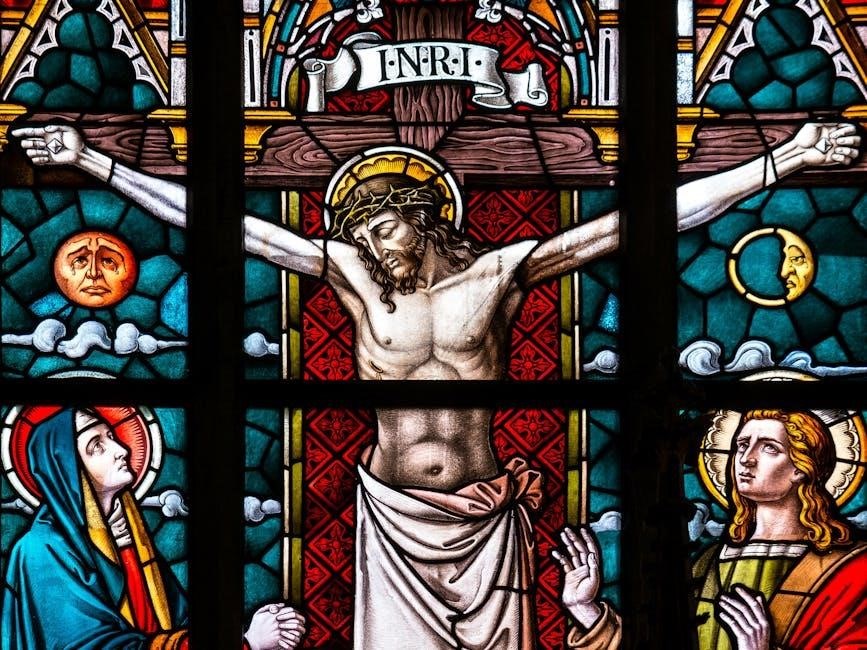The seven sayings of Jesus on the cross are an integral part of Christian traditions, with several composers setting the sayings to music and being deeply examined.
Overview of the Topic
The seven sayings of Jesus on the cross are a significant aspect of Christian theology, with various interpretations and explanations. According to the Bible, Jesus uttered seven phrases during his crucifixion, which have been recorded in the Gospels. These sayings provide insight into Jesus’ character, his relationship with God, and his message to humanity. The sayings have been extensively studied, reflected upon, and set to music by numerous composers. They are an integral part of Christian traditions, including Catholic, Protestant, and other denominations. The topic is widely discussed in religious circles, with many resources available, including books, articles, and online materials, such as the seven sayings of Jesus on the cross with explanation PDF, which offers a comprehensive understanding of this crucial aspect of Christian faith. The sayings are also used in liturgy and worship services.

The Importance of the Seven Sayings
The seven sayings are crucial to Christian faith and theology, revealing Jesus’ character and message to humanity, with significant impact on believers’ lives and spirituality always.
Meaning and Explanation
The meaning and explanation of the seven sayings of Jesus on the cross are deeply rooted in Christian theology, providing insight into Jesus’ character and message.
The sayings are recorded in the Gospels and have been interpreted in various ways throughout history, with each saying offering a unique perspective on Jesus’ teachings and legacy.
The explanation of these sayings is crucial to understanding the significance of Jesus’ death and resurrection, and their impact on Christian faith and practice.
By examining the meaning and explanation of the seven sayings, believers can gain a deeper understanding of Jesus’ message and its relevance to their lives.
The seven sayings are a powerful reminder of Jesus’ love and sacrifice, and their meaning and explanation continue to inspire and guide Christians today.
The explanation of these sayings is a key part of Christian devotion and worship.
The Seven Words of Jesus on the Cross
Jesus’ seven words on the cross are recorded in the Gospels, revealing his character and message to humanity clearly and profoundly always.
The First Word
The first word of Jesus on the cross is a prayer, where he asks his Father to forgive those who are crucifying him, showing his compassion and mercy.
This word is recorded in the Gospel of Luke, and it sets the tone for the rest of his sayings, revealing his character and message to humanity.
The first word is a demonstration of Jesus’ commitment to forgiveness and love, even!
In the face of great suffering and injustice, he chooses to pray for his enemies, rather than curse them.
This word has been a source of inspiration and guidance for Christians throughout history, reminding them of the importance of forgiveness and compassion.
It is a powerful example of Jesus’ teachings on love and forgiveness, and it continues to be a relevant and challenging message today, for all people.
Reflections on the Seven Last Words
Christ’s last words reveal his character and message to humanity through forgiveness and love always.
Worldview Realities
The seven last words of Jesus on the cross reveal significant worldview realities, including the importance of forgiveness and compassion.
The sayings also highlight Jesus’ concern for others, even in his final moments, and demonstrate his commitment to his mission.
According to the Colson Center, the seven last words provide valuable insights into the Christian worldview, and offer a unique perspective on the nature of God and humanity.
The words of Jesus on the cross have been the subject of much reflection and meditation, and continue to be an important part of Christian tradition and practice.
The worldview realities revealed in the seven last words are complex and multifaceted, and offer a rich source of spiritual guidance and inspiration.
The sayings have been widely studied and interpreted, and remain a vital part of Christian theology and devotion, shaping the way Christians think about the world and their place in it.

Examining the Seven Sayings
Christian traditions deeply examine the seven sayings of Jesus on the cross for spiritual guidance and insight into his final moments.
A Deep Examination
A deep examination of the seven sayings of Jesus on the cross reveals the significance of his final words, with each phrase holding profound meaning and spiritual guidance.
The examination process involves analyzing the context and circumstances surrounding each saying, as well as exploring the theological and emotional implications of Jesus’ words.
This in-depth analysis allows for a richer understanding of the event and its relevance to Christian traditions and values.
By exploring the seven sayings in detail, individuals can gain a deeper appreciation for the importance of forgiveness, compassion, and faith, and can reflect on the ways in which Jesus’ final words continue to inspire and guide people today.
The examination of these sayings can be a powerful tool for personal reflection and spiritual growth, and can provide a deeper understanding of the significance of the crucifixion event.

The Sequence of the Seven Sayings
The sequence of sayings is traditionally arranged according to accounts in the Gospels of Luke and John and other sources available online today always.
According to the Gospels
The Gospels of Luke and John provide the primary accounts of the seven sayings of Jesus on the cross. According to these accounts, the sayings are recorded in a specific sequence, with some sayings appearing in multiple Gospels. The Gospel of Luke records three of the sayings, while the Gospel of John records three as well; The Gospel of Matthew and Mark record one saying each. The sequence of the sayings according to the Gospels is an important aspect of understanding the context and meaning of Jesus’ final words. By examining the accounts in the Gospels, readers can gain a deeper understanding of the significance of the seven sayings and their relevance to Christian traditions and teachings, which are widely available online and in various religious texts and resources. The Gospels provide a detailed and informative account of Jesus’ final hours.

Teaching and Learning about the Seven Sayings
University of Pretoria produces high quality teaching and learning resources online freely.
High Quality of Teaching and Learning
The University of Pretoria is known for producing high quality teaching and learning resources, which is evident in their approach to educating students about the seven sayings of Jesus on the cross. Their resources are designed to be engaging and informative, making it easier for students to understand the significance of the seven sayings. The university’s website provides a wealth of information on the topic, including articles, videos, and podcasts that offer a deeper understanding of the seven sayings. By utilizing these resources, students can gain a more comprehensive understanding of the subject matter and develop a stronger appreciation for the importance of the seven sayings in Christian traditions. The university’s commitment to high quality teaching and learning is reflected in their online resources, which are available to students and scholars around the world.
The seven sayings of Jesus on the cross are deeply meaningful and impactful Christian traditions and teachings always remembered.
Final Thoughts
The seven sayings of Jesus on the cross are a profound reflection of his character and teachings, offering valuable insights into his worldview and values.
These sayings have been extensively studied and meditated upon by Christians, providing a deeper understanding of Jesus’ message and its significance.
The importance of these sayings lies in their ability to convey complex theological concepts in a simple and accessible manner, making them a powerful tool for spiritual growth and development.
By examining these sayings, individuals can gain a deeper appreciation for the life and teachings of Jesus, and cultivate a more meaningful and personal relationship with him.
The seven sayings of Jesus on the cross are a timeless and universal message, transcending cultural and denominational boundaries, and speaking to people from all walks of life.
They continue to inspire and guide people, offering a sense of hope and comfort in times of need.
